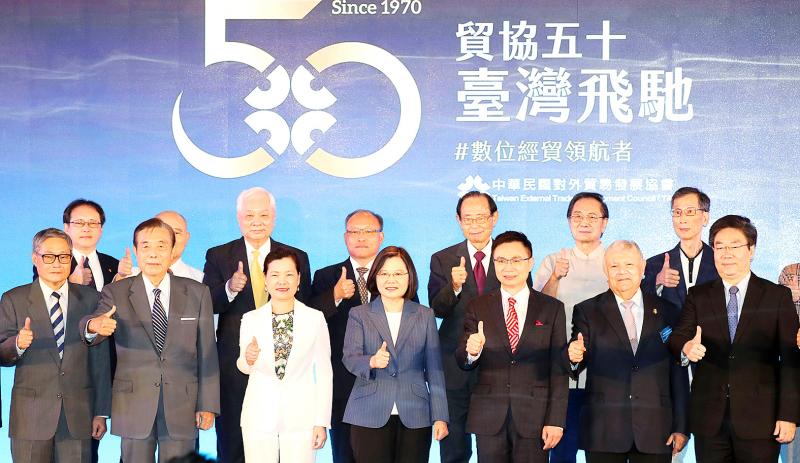The Taiwan External Trade Development Council (TAITRA, 外貿協會) yesterday presented a demo of a virtual-reality (VR) trade show system at the council’s 50th anniversary celebration in Taipei, after several trade exhibitions have been canceled this year due to the COVID-19 pandemic.
“COVID is changing the way the world does business forever, and we have to be up to the challenge,” TAITRA chairman James Huang (黃世芳) said at the ceremony.
“Online exhibitions and product announcements will become the new normal. This new VR trade exhibition system will help Taiwanese companies compete,” Huang said.

Photo: CNA
Government-backed TAITRA organizes almost 40 trade shows a year, including Computex Taipei, the Taipei International Cycle Show and the Taiwan International Boat Show.
While the pandemic has resulted in the cancelation of many exhibitions, Huang said that TAITRA has made an effort to support Taiwanese businesses using technology, such as through hackathons and the Global Anti-COVID-19 Pavilion, an online information center featuring Taiwanese products.
Footwear, textile and mechanical parts manufacturers have been particularly hard hit by the outbreak, Huang said.
However, there are also bright spots, he said.
“Bicycle manufacturers have been doing very well because of the policies of the Japanese and European governments, which have used subsidies to encourage people to ride bikes rather than taking public transportation,” Huang said.
Businesses related to cloud services have also posted sales increases due to COVID-19, he added.
“It’s been a very patchy year overall, but our rate of economic growth for the first half of the year is still more than 1 percent,” Huang said. “Comparatively speaking, we have been blessed.”
The VR trade show system was developed by XRSpace Co Ltd (未來市). Company founder Peter Chou (周永明) used a VR headset to demonstrate how buyers and sellers can use the system to interact, shake hands and explore a virtual exhibition space.
The XRSpace MANOVA VR system would be available to the public from this month and is the first VR system that does away with the need for controllers, relying solely on hand gestures for interactivity, the company said.
Even though the focus of yesterday’s ceremony was on VR and digital technology, Huang said that Taiwan’s traditional industries have not been forgotten.
Now that the World Organisation for Animal Health has declared Taiwan proper, Penghu and Matsu a foot-and-mouth disease-free zone where vaccination is not practiced, Huang said he is determined to regain the lost Japanese market.
“Japan used to buy half their pork from us. They’ll buy from us again when we show them that Taiwanese pork is the best pork for Asian cuisine,” he said.
At the anniversary ceremony, Minister of Economic Affairs Wang Mei-hua (王美花) praised TAITRA for playing a pivotal role in helping create the “Taiwan miracle.”
“Fifty years ago our gross foreign trade was only US$2.2 billion. Last year it was US$614 billion,” Wang said, “Thanks to TAITRA, foreign buyers discovered many products from Taiwan’s small and medium-sized businesses.”
Also at the ceremony, President Tsai Ing-wen (蔡英文) affirmed TAITRA’s role not only in promoting trade, but diplomacy, too.
“Under Taiwan’s unique diplomatic circumstances, TAITRA has more opportunities than the government to communicate widely and meaningfully all over the world. This helps Taiwan create diplomatic space,” Tsai said.

SEMICONDUCTORS: The German laser and plasma generator company will expand its local services as its specialized offerings support Taiwan’s semiconductor industries Trumpf SE + Co KG, a global leader in supplying laser technology and plasma generators used in chip production, is expanding its investments in Taiwan in an effort to deeply integrate into the global semiconductor supply chain in the pursuit of growth. The company, headquartered in Ditzingen, Germany, has invested significantly in a newly inaugurated regional technical center for plasma generators in Taoyuan, its latest expansion in Taiwan after being engaged in various industries for more than 25 years. The center, the first of its kind Trumpf built outside Germany, aims to serve customers from Taiwan, Japan, Southeast Asia and South Korea,

Gasoline and diesel prices at domestic fuel stations are to fall NT$0.2 per liter this week, down for a second consecutive week, CPC Corp, Taiwan (台灣中油) and Formosa Petrochemical Corp (台塑石化) announced yesterday. Effective today, gasoline prices at CPC and Formosa stations are to drop to NT$26.4, NT$27.9 and NT$29.9 per liter for 92, 95 and 98-octane unleaded gasoline respectively, the companies said in separate statements. The price of premium diesel is to fall to NT$24.8 per liter at CPC stations and NT$24.6 at Formosa pumps, they said. The price adjustments came even as international crude oil prices rose last week, as traders

Taiwan Semiconductor Manufacturing Co (TSMC, 台積電), which supplies advanced chips to Nvidia Corp and Apple Inc, yesterday reported NT$1.046 trillion (US$33.1 billion) in revenue for last quarter, driven by constantly strong demand for artificial intelligence (AI) chips, falling in the upper end of its forecast. Based on TSMC’s financial guidance, revenue would expand about 22 percent sequentially to the range from US$32.2 billion to US$33.4 billion during the final quarter of 2024, it told investors in October last year. Last year in total, revenue jumped 31.61 percent to NT$3.81 trillion, compared with NT$2.89 trillion generated in the year before, according to

PRECEDENTED TIMES: In news that surely does not shock, AI and tech exports drove a banner for exports last year as Taiwan’s economic growth experienced a flood tide Taiwan’s exports delivered a blockbuster finish to last year with last month’s shipments rising at the second-highest pace on record as demand for artificial intelligence (AI) hardware and advanced computing remained strong, the Ministry of Finance said yesterday. Exports surged 43.4 percent from a year earlier to US$62.48 billion last month, extending growth to 26 consecutive months. Imports climbed 14.9 percent to US$43.04 billion, the second-highest monthly level historically, resulting in a trade surplus of US$19.43 billion — more than double that of the year before. Department of Statistics Director-General Beatrice Tsai (蔡美娜) described the performance as “surprisingly outstanding,” forecasting export growth